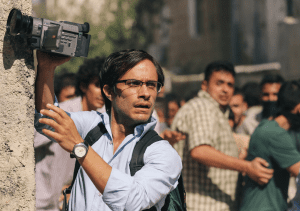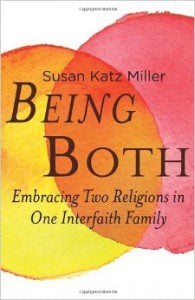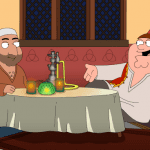 |
|
You can’t see white robes in a dark theater
|
In my favorite scene in the film Monty Python and the Holy Grail, a group of villagers brings forward a woman who they accuse of being a witch. They reason that since witches burn because they are made of wood and if wood, like a duck, floats, that: “If… she… weighs… the same as a duck… she’s made of wood… And therefore?… A witch!”
If this same flawed logic is employed, then Islam: What the West Needs to Know can properly be considered a film. It is slapped together with the same cinematic finesse as an in-flight safety video and peppered with special “effects” and talking head “experts” one would only find in a Monty Python skit and, well, this “film.”
The producers are Quixotic Media, an unnamed team (at least on their website) that “seeks to take on issues of social significance that major media will not.” The end credits list the producers/directors as Gregory M. Davis and Bryan Daly, both people with names generic enough that my Google searches did not produce any information about them, nor does their website says much else about them and I should note looks as if it has been put together by a seventh grade student begrudgingly taking a web site design class. (Note #1 to producers: fire your web designer.)
The central thesis of the film is that contrary to what western leaders may say, Islam is not a religion of peace. The film starts with a series of clips from President Bush and Prime Minister Blair who each say that Islam is not a religion of violence. The film’s website notes, “Virtually every major Western leader has over the past several years expressed the view that Islam is a peaceful religion and that those who commit violence in its name are fanatics who misinterpret its tenets.” Aside from Bush’s problematic understanding of peace (in which even the likes of Ariel Sharon is called a man of “peace”), the directors fail to see how statements like this often constitute political posturing meant to distract from often bellicose, discriminatory, or lop-sided policy. The films two clips of Bush and Blair are, ironically, speeches announcing the commencement of the Iraq war. They also fail to to mention that many western leaders – Silvio Berlusconi, Vladimir Putin, General Boykin, for example – have made little effort to hide their contempt for Islam and its adherents.
The directors believe we have been duped. The result is a comically self-righteousness 98-minute film that seeks to correct (and to warn) the west one simple thing: Islam is not what you think. It’s a religion of violence. “What part of kill don’t you understand?” one “expert” says, looking deadpan. It’s a priceless moment that should ideally be punctuated by a scene of a burly man taking a large bite out of an oversized, chicken drumstick.
The film is divided into six parts, each part bearing a catchy name like “more than a religion.” Interspersed between the interviews with the film’s six or seven “experts,” are quotes from the Qur’an or hadith read by the film’s narrator who would win hands down in a contest to impersonate Steven Colbert’s fake news voice. As the narrator speaks, we see the shot of a fuzzy Mughal miniature, which truthfully looks like an ancient rendition of Jimi Hendrix and his burning guitar. (Note #2 to producers: invest in a better scanner and art research department next time.)
But a summer film would be remiss without special effects and “Islam: What the West Needs to Know” is not without them. In my favorite segment, we see a bird’s eye view of a computer generated world map as the narrator talks about the conquest of Islam throughout the world. Each time the narrator mentions a country that Muslims invaded, a small fire lights up in that country. Did the producers really expect to include such sophomoric tricks and yet also be taken seriously? (Note #3 to producers: Qatar is missing on one of your maps.)
Aside from the film’s homage to cheesy South Asian wedding video special effects, we are subjected to hearing five or six talking heads offering their “expertise.” One of them is Robert Spencer, a Frontpage magazine columnist and current director of JihadWatch. He sprinkles his observations about Islam with a liberal use of Arabic terms, as if somehow this is supposed to impress us. There can be a peaceful Muslim, he tells us, but not a peaceful Islam. Later in the film, he credits Edward Said as someone who Islamized Middle Eastern Studies in the US and wrote his seminal Orientalism to silence critics of Islam. It’s a scene that is more embarrassing than offensive.
Another expert we hear from his Srđa Trifković, a Serbian historian who served as a spokesman for the Bosnian Serbian government. He has called the rape of Bosnian women “entirely fictitious” and once said, “For a Christian the real task is to help our fellow humans who are trapped in Islam and to help them become free.” His comments in the film are so absurd that to respond would only be to give credence to his assertion of being a “historian.”
The film does, however, have its redeeming moments. Bat Ye’or, an Egyptian born British Jew whose books include titles like The Decline of Eastern Christianity under Islam, offers a useful grammatical lesson on to use the word infidel in a sentence. She sprinkles her commentary with sentences like “Islam is a religion started to fight infidelity and to bully infidels until they rid the infidels of their infidelity.” Its no wonder that Sidney H. Griffith in the International Journal of Middle East Studies writes of her: “The problems one has with the book are basically twofold: the theoretical inadequacy of the interpretive concepts jihad and dhimmitude, as they are employed here; and the want of historical method in the deployment of the documents which serve as evidence for the conclusions reached in the study. There is also an unfortunate polemical tone in the work.”
My favorite commentator in the “film” is Walid Shoebat, author of Why I left Jihad. A native of Palestine, he compares joining a Palestinian terrorist group to rushing a fraternity. “The martyrdom applications were full,” he says. “We had initiation ceremonies which included killing a Jew.” But his story lacks credibility. Perhaps this is because he seems too eager to denigrate his old self in order to self-aggrandize his present post-Islam enlightenment. In one scene, he talks about watching CNN at work during the first Gulf, when he was still a terrorist sympathizer. “Watching the TV with my colleagues at work I had to restrain my excitement when I saw the American targets being hit by Sadaam,” he said. “I would drive home from work with my windows open, put my head out the window, and shout Allah-u Akbar the entire way home,” he says. It’s a visual that just begs comparison to Jim Carrey’s driving antics in “Ace Ventura.” The question is – how do you go from that form of (silly) zealotry to Fox News Islam basher and Zionist apologist in just ten years?
There are many more oddities like this in the film, including clips of Muslims speaking at rallies and Friday prayers, etc. One of the clips, to the credit of the producers, is powerful and disturbing because it shows a group of British Muslims who chant that they will destroy England and then take their women as war booty. But the other clips are odd selections, including one from a Friday prayers at a Sunni, Baathist mosque in Iraq on the eve of US invasion. Should we blame the audience and the khatib for feeling a bit testy just days before the “shock and awe” campaign? (Note #4 to producers: If you want to show Muslims looking bad, you will have to do more than show a bunch of uncles in ill-fitting salwar khamezes. Perhaps you should show footage about honor crimes in Pakistan or sectarian violence in Iraq, both examples of the often-deplorable tendencies of some Muslims.)
How then should Muslims regard this film? To call it offensive is as painstakingly obvious as saying that water is wet. The more important question is whether the film is inciteful. I am disinclined to believe so. Inciteful films – and oddly I have seen a fair share – succeed by emotionally manipulating the audience and directing their rage at a given community, implicitly urging often-violent action. But “Islam: What the West Needs to Know” is benign because it is likely to be regarded as authoritative only by that rare sub-segment of society that finds reality shows like “Wife Swap” to be high culture.
That indeed may be its redeeming quality – the film is as flawed and deceitful as a businessman hawking a pyramid scheme. And we all know that no one, of course, has ever fallen for a pyramid scheme.
Zahir Janmohamed, co-founder of The Qunoot Foundation, is still trying to figure out the air speed velocity of a swallow carrying a coconut.











